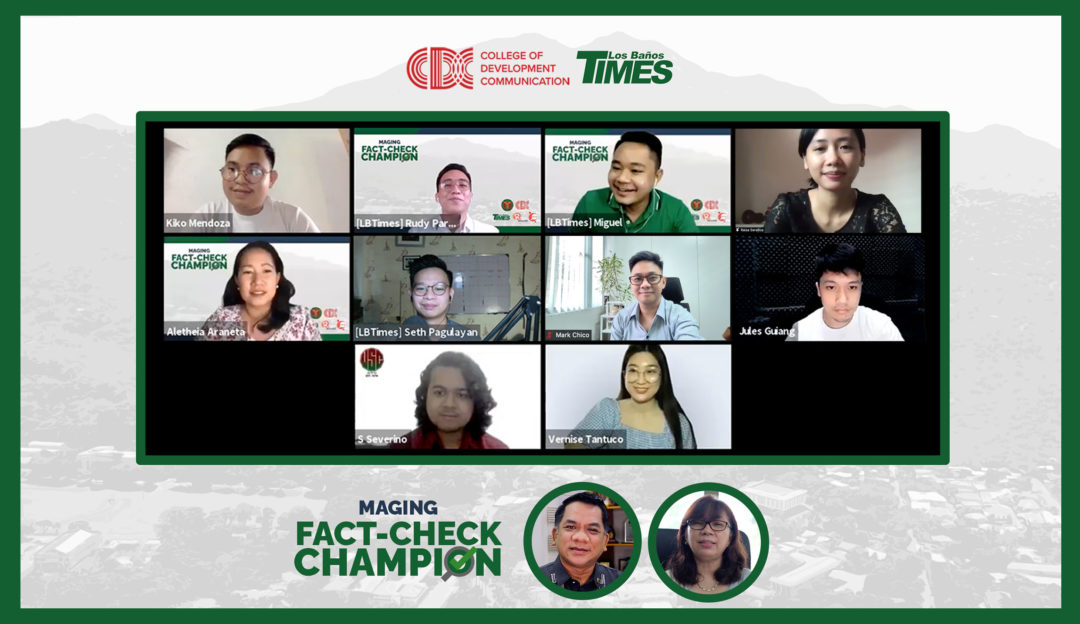The Los Baños Times and MovePH, Rappler’s civic engagement arm, led the fact-checking webinar “Maging Fact-Check Champion”via video conference and Facebook live on Oct. 18
LB Times is the multimedia community news platform of the Department of Development Journalism (DDJ) at the College of Development Communication (CDC). The webinar was co-hosted by the CDC Student Council.
The two main speakers from Rappler were Raisa Serafica, head of Civic Engagement, and Vernise Tantuco, writer and researcher. Both of them have been on the frontlines of Rappler’s fact-checking efforts, having trained over 10,000 individuals all over the country online and offline. It was the first time that Rappler co-hosted a fact-checking webinar at UPLB.
In her talk on infodemic, Serafica likened the rapid spread of false information to that of the coronavirus and said that if a lie is repeated often enough, it becomes the truth. She said that such false information are spread by influencers and trolls, who are paid to mislead netizens to forward certain political agenda. Hence, fact-checking is a concrete and proactive means by which netizens can combat such disinformation peddlers.
On the other hand, Tantuco discussed Rappler’s fact-checking methodology, which is aligned with the code of principles of Poynter Institute’s International Fact-Checking Network (IFCN). Rappler is only one of two news agencies in the Philippines that is a signatory of IFCN and is a third-party fact-checker of Facebook. The other agency is Vera Files. Tantuco also discussed various techniques and tools in fact-checking, which she demonstrated to the participants through a short workshop.
Lastly, Miguel Victor T. Durian, University Extension Associate II of DDJ and project leader of the Maging Fact-Check Champion, enjoined the participants to volunteer for Rappler through its Fact-Checking Mentorship Program of which he is a trainee. The webinar is his final project for the program. He also encouraged the participants to organize similar campaigns in their own communities.
Siegfred R. Severino, chairperson of the UPLB University Student Council (USC), which also co-presented the webinar, delivered a solidarity message, enjoining the youth to become more critical of social media posts, especially with the nearing 2022 elections, and to educate their relatives and friends on fact-checking.
In his opening remarks, Chancellor Jose V. Camacho Jr., who was represented during the webinar by Director Mark Lester Chico of the UPLB Office of Public Relations (OPR), acknowledged the relevance of fact-checking as a weapon in fighting disinformation that is rampant today. He also commended CDC for initiating the campaign in Los Baños.
In her welcome remarks, Dr. Maria Stella C. Tirol, dean of CDC, oriented the participants in the field of development communication and its relevance in the current era and called on community journalists and mainstream journalists to work together to conquer the infodemic.
Lastly, Aletheia C. Araneta, chair of DDJ and program leader of LB Times, closed the event by highlighting the crucial role of journalists in bringing timely and accurate political and health information to the public during the pandemic and the election season. She also thanked Rappler for partnering with CDC in bringing its fact-checking campaign to the Los Baños community.
“Maging Fact-Checking Champion” was co-presented by the Los Baños Science Community Foundation Inc. (LBSCFI), which also tackled the similar issue of addressing the COVID-19 infodemic in its 20th anniversary celebration in July 2021.
Other co-presenters were the three student organizations of CDC, namely the UP Community Broadcasters’ Society Inc., UPLB Development Communicators’ Society Inc., and the UP Alliance of Development Communication Students.
Serving as emcees of the event were the CDC Student Council’s Chairperson Seth Alfred D. Pagulayan and Batch 2019 Representative Rudy P. Parel Jr.
The webinar was primarily intended for constituents of Los Baños and nearby communities, but it attracted the participation of various individuals from all over the country, mostly from state universities and colleges. Almost 700 people participated in the Zoom session, which was also livestreamed via the Fact-checking in the Philippines Facebook group, which has almost 6,000 members. More than 2,000 individuals initially registered for the webinar. (Nel Benjamin Magdaleno)
This article was originally published on the UPLB website.

